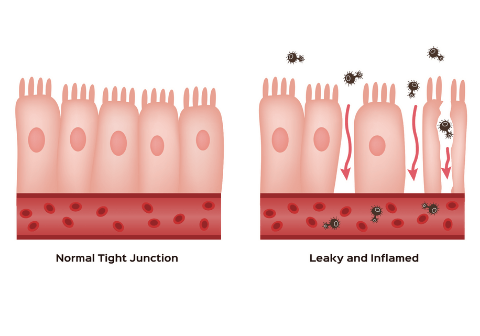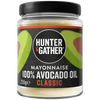Those struggling with leaky gut syndrome know all too well how much it can affect your day-to-day life. While there is no magic pill you can take to reverse this complex health ailment, collagen can play an important role in healing—and potentially even preventing—leaky gut.
In this article, we’ll be exploring how consuming collagen can support a healthy gut and facilitate healing from leaky gut syndrome, but first, let’s cover some basics.
What Is Leaky Gut Syndrome?

The only thing that separates your digestive system from your bloodstream is a single-cell-deep protective lining. This lining acts as a barrier, selectively allowing certain essential nutrients to pass into your bloodstream through what are called tight junctions (or teeny-tiny holes).
In a person with a healthy gut, these holes are only small enough to allow absorbable nutrients through. In a person with leaky gut syndrome, on the other hand, the proteins that make up tight junctions begin to deteriorate, making the holes larger than usual. This happens over time due to things like poor diet, stress, bacterial imbalance, excessive antibiotic use, and food sensitivities.
These larger-than-normal gaps allow particles to enter the bloodstream, including undigested food, toxins, viruses, and bacteria, that would otherwise be discarded as waste.
This can trigger your immune response to always be “on,” as it’s constantly defending against foreign invaders in the bloodstream. As a result, a person with leaky gut syndrome can develop systemic inflammation and a myriad of health problems and symptoms, including food sensitivities, allergies, bloating, chronic fatigue, joint pain, arthritis, autoimmune conditions, skin rashes, and depression, just to name a few.[*]
What Is Collagen?
Collagen is the most abundant type of protein in the human body and is found in almost every tissue. It acts as “glue,” holding parts of the body together, including muscles, bones, skin, blood vessels, tendons, and the lining of the digestive system.
Our bodies naturally produce collagen, however, its production starts to slow down in a person’s early twenties and decreases about one percent a year.[*]
You can also obtain collagen from certain foods, but modern diets are severely lacking in collagen. Most people eat muscle meats, which are high in protein but low in collagen. Our ancestors, on the other hand, ate lots of collagen-rich foods from animals, including fish skin, organ meats, cartilage, and tendons.
How Collagen Can Help with Leaky Gut Syndrome
Collagen is brimming with huge servings of amino acids, including glycine, proline, hydroxyproline, and arginine, which act as building blocks for the cells of your gut wall. Research has shown that the amino acids in collagen work together to mend the damaged cells lining your gut wall, thereby restoring the integrity of your intestinal lining.[*][*]
Studies have also shown that collagen can strengthen the gut by providing more resistance to elastic stretch.[*] This resistance is important, as excessive stretching can gradually wear out tight junctions and cause intestinal cells to misalign or sit further apart, eventually leading to increased “leakiness.”[*][*]
With these benefits in mind—providing necessary building blocks, helping cells align properly, and strengthening the tight junctions of the gut lining—you can see how collagen can play an important role in healing leaky gut syndrome.
How to Incorporate Collagen into Your Routine

Although your body naturally produces collagen, there are a couple of ways that you can boost your collagen stores. The first way is to consume collagen-rich foods, including bone broth, offal (i.e. animal organs and other tissues), and fish skin.
Unfortunately, obtaining collagen through food sources is not always easy and effective. The percentage of collagen in these foods can be quite low and obtaining and preparing these foods can be quite inconvenient—not to mention unappetising for many.
The easiest, most surefire way to boost your intake of collagen is by adding a high-quality collagen supplement to your daily routine, such as Hunter & Gather’s bovine-based collagen peptide powder or marine-based collagen peptide powder. You can easily mix these collagen powders into smoothies, soups, coffee, tea, and sauces.
Hunter & Gather collagen is sourced from high-quality animal sources (pasture-raised cattle and wild-caught fish), laboratory tested for contaminants, and free of ingredients like grains, dairy, sugar, artificial flavours, and GMOs.
Additional Dietary Tips for Healing Leaky Gut
While adding collagen to your routine can play a key role in healing leaky gut syndrome, it likely won’t reverse your condition all on its own. Because one of the leading causes of leaking gut is poor diet, many people need to make some serious diet changes to heal leaky gut.
Here are some additional dietary tips for restoring your gut health:
- Go low-carb: By following a Paleo/Keto diet that is lower in carbs, moderate in protein, and high in fat, you’ll eliminate inflammatory foods, including grains, legumes, sugar, and dairy.
- Eat whole, unprocessed foods: Your gut can become damaged when you eat a processed diet that’s high in sugar. One of the best ways to support your gut health is to cut out refined sugar and refined carbs like pasta, breads, and cereal.
- Eat good fats: Healthy fats like omega-3 fatty acids and monounsaturated fats, such as extra-virgin olive oil, help decrease inflammation throughout the body, including the gut.[*]
- Add fermentable fibers: Fermentable fibers—found in foods like artichokes, onions, garlic, and plantains—fuel the growth of beneficial gut bacteria and help heal increased gut permeability.
- Include fermented foods: Fermented foods are rich in probiotics, which help restore a healthy gut microbiota and intestinal barrier. Some good options include unpasteurized sauerkraut, kimchi, kombucha, yogurt, and kefir.
To Help Heal Leaky Gut, Up Your Collagen
For those experiencing leaky gut syndrome, collagen is a real superhero that can help “heal and seal” a leaky gut, especially when combined with the other dietary recommendations mentioned above.
Healing leaky gut is not something that happens overnight, but with consistency and patience, your gut will eventually heal, allowing you to feel and function your best.
All information provided on our website and within our articles is simply information, opinion, anecdotal thoughts and experiences to provide you with the tools to thrive.
It is not intended to treat or diagnose symptoms and is definitely not intended to be misconstrued for medical advice. We always advise you seek the advice of a trained professional when implementing any changes to your lifestyle and dietary habits.
We do however recommend seeking the services of a trained professional who questions the conventional wisdom to enable you to become the best version of yourself.











